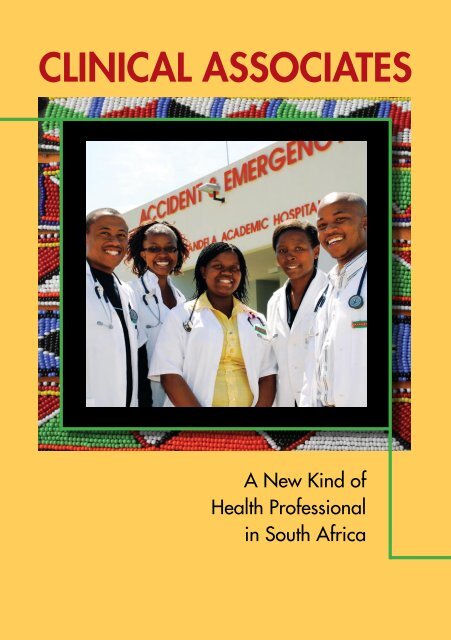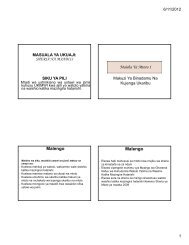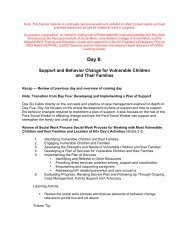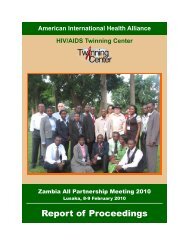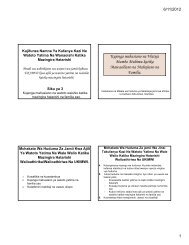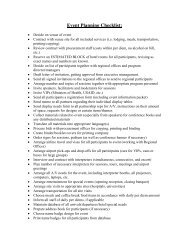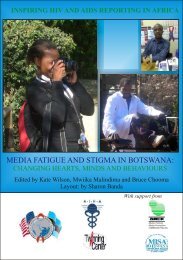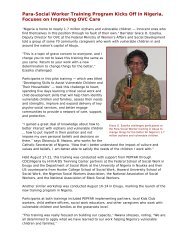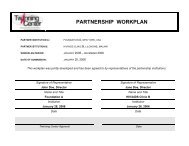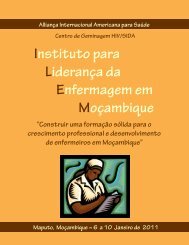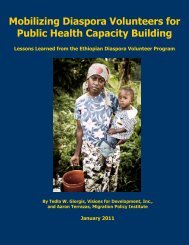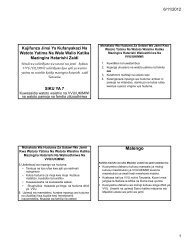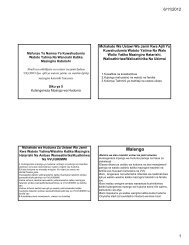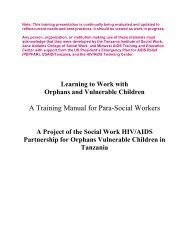CliniCal assoCiates - HIV/AIDS Twinning Center
CliniCal assoCiates - HIV/AIDS Twinning Center
CliniCal assoCiates - HIV/AIDS Twinning Center
You also want an ePaper? Increase the reach of your titles
YUMPU automatically turns print PDFs into web optimized ePapers that Google loves.
Clinical AssociatesA New Kind ofHealth Professionalin South Africa
“Clinical Associates will be competent, professional membersof the public healthcare sector. They have the necessaryknowledge, skills, and attitudes to function effectively inthe district health system, primarily working under thesupervision of qualified medical practitioners, to assist withemergency care, procedures, and inpatient care.”– Dr. Aaron Motsoaledi, National Minister for Health, South Africa.“In the Eastern Cape where our Clinical Associates areworking, patients often travel great distances to go tohospital because local healthcare clinics are so understaffed.The Clinical Associates will help the doctors by relieving theirworkload, which will allow doctors to focus on more complexcases. Patients will be treated sooner and closer to theirhomes and that will help reduce the disease burden in SouthAfrica and help improve overall patient outcomes.– Prof. Khaya Mfenyana, Executive Dean,Faculty of Health Sciences, Walter Sisulu University.“Clinical Associates will play a vitally important role in ruralhealthcare. From the outset, rural doctors have welcomed thisnew cadre of workers and have looked forward to workingwith them. Their support of the team in rural district hospitalswill ensure better care for patients and will also enabledoctors to engage in greater outreach to clinics.”– Prof. Ian Couper, Director,Centre for Rural Health, University of the Witwatersrand.“The Faculty is proud of the quality of its Clinical AssociateProgramme, and of the standards achieved by the first cohortsof students. We look forward to the graduates playing a vitalrole in ensuring access to quality care for all South Africans.”– Prof. Eric Buch, Dean, Faculty of Health Sciences, University of Pretoria.
Providing Quality Care to People in NeedIn many rural parts of South Africa, people have extremely limited access toquality healthcare services. This is largely due to weak district health systemsand a severe lack of trained human resources for health. For the country as awhole, the doctor-to-population ratio is estimated to be 0.77 per 1,000. Because73 percent of all general practitioners work in the private sector, however,there is just one practicing doctor per every 4,219 people for the vast majorityof the population.In response, the South African National Department of Health began to exploredifferent avenues of increasing the number of skilled healthcare providersavailable in underserved provinces. In 2004, they assembled a National TaskTeam to establish a scope of practice, training curriculum, and exit outcomesfor a new mid-level healthcare provider and the Clinical Associates professionwas born.Similar to Physician Assistants in the United States and other mid-level cadresin Kenya, Tanzania, and Uganda, Clinical Associates are university-trainedmedical professionals who work primarily at district hospitals throughout SouthAfrica. They are an integral member of the clinical team, working under thesupervision of doctors to provide medical services ranging from taking patienthistories and performing routine examinations to providing emergency care foracute conditions and managing chronic diseases such as hypertension, diabetes,and <strong>HIV</strong>/<strong>AIDS</strong>.Clinical Associates are competent, professional members of the healthcare team.They are armed with the knowledge, training, skills, and commitment necessaryto function effectively within the district health system in South Africa.The Clinical Associate Programmes are offered in partnership with national andprovincial departments of health, as well as the South Africa Military HealthService (SAMHS).
What Qualifies a Clinical Associate to Practice?Clinical Associates are required to earn a Bachelor of Clinical Medical Practicefrom an accredited university to qualify for registration with the Health ProfessionsCouncil of South Africa.Rooted in problem-based learning, this 3-year course of study emphasizes theacquisition of hands-on clinical skills that Clinical Associates need to take theirplace as essential members of district-level care teams. The rigorous, nationallystandardized curriculum is competency-based. It prepares students to provideany medical service within their scope of practice that is delegated to them bythe supervising medical practitioner.During their initial year of study, Clinical Associate students spend the earlypart of their first semester learning clinical theory and practice on the MedicalCampus, with a strong focus on learning how to take a detailed patient historyand conduct a clinical examination. For the remainder of the three years, studentslearn through actual practice at clinical sites — mostly hospitals in rural settings.The training Clinical Associates receive prepares them to provide a broad rangeof medical care, including but not limited to:• Obtaining patient histories• Performing physical exams• Ordering diagnostic or therapeutic procedures• Interpreting findings and diagnosing common emergency conditions• Developing and implementing a treatment plan• Monitoring efficacy of therapeutic interventions• Assisting with surgeries• Providing patient education and counseling• Making appropriate referrals for specialized care
Walter Sisulu UniversityClinical Associate Programme SnapshotLocated in Eastern Cape Province, Walter Sisulu University is one of threehistorically black South African universities established in the so-called‘independent homelands’ during the twilight years of apartheid. Its MedicalFaculty was established in 1985. Striving to be a leading African university,Walter Sisulu implements comprehensive and innovative educational, research,and community partnership programs that are responsive to local, regional, andnational development priorities while at the same time cognizant of continentaland international imperatives.Walter Sisulu’s programmes are rooted in problem-based learning, communitybasededucation, and community partnerships to better improve the quality of lifeof all the people served. Its Medical Faculty is internationally recognized as oneof eight medical schools in the world that are champions of social accountabilityin health professions education. As such, Walter Sisulu’s educational programmesfeature a strong community service component. They also place a special emphasison primary health care and sustainable rural development. Medical training ishighly integrated with community linkages through the Academic Health Complexof the Eastern Cape, which comprises all of the tertiary hospitals in the province,some of the district hospitals, and academic primary health centers.Walter Sisulu University was the first institution in South Africa to commencetraining through the Clinical Associate Programme by accepting its first cohort of23 students in January 2008. All 23 obtained their degrees and were graduatedfrom the programme in May 2011. Its second cohort of 22 students will graduateat the end of 2011. A third cohort of 24 students will graduate at the end of2012, while the fourth cohort of 32 students will complete their course of studyat the end of 2013.With the goal of ensuring that its Clinical Associate students stay and serve inthe rural areas where they are most needed, Walter Sisulu’s admissions processfavors individuals of rural origin because studies have repeatedly shown that themain determinant of rural practice is the background of the student.For more information about Walter Sisulu’s programme, please contactDr. Mukund Khatry-Chhetry, Clinical Associate Programme Coordinator, atmkhatry-chhetry@wsu.ac.za.
“I began working as a Clinical Associate at Victoria Hospitalon Jan. 3, 2011. There are only eight doctors, so I know thatthey really appreciate the work we are doing here. I think thetraining I received at Walter Sisulu has prepared me to makea difference. That is important to me because I want to berecognized as a skilled professional within the hospital. It’salso my goal to help improve the quality of care for people,especially the elderly and those with chronic conditions like<strong>HIV</strong> who live in rural areas.”– Sihle Lawana, Clinical Associate at Victoria Hospital in Alice,Eastern Cape Province, and graduate of Walter Sisulu University’sfirst cohort of Clinical Associate students.
“I knew I wanted to be in the medical field helping people and,in particular, to gain experience in the rural health setting. Thisnew Clinical Associate Programme seemed interesting and wasmy first step in being able to do this. We have had a fair share oflearning medical theory and practice, along with how to applyit in the clinical setting. The programme is designed for us towork in the community and I am hopeful this will be a benefitto the community, as well as to our fellow healthcare workersand patients.”– Alysson James (center), current 3rd year Clinical Associate student slated tograduate in November 2011 from the University of the Witwatersrand.
University of the WitwatersrandThe University of Witwatersrand (Wits) is situated in Johannesburg, the social andeconomic hub of South Africa. With a strong reputation built on research andacademic excellence, Wits is one of only two universities in Africa ranked as aleading world institution of higher education. The Wits Faculty of Health Scienceshas a high reputation for scholarship in health sciences teaching, research, andclinical service. It provides undergraduate, postgraduate, and professional training— particularly in the South African and sub-Saharan context — offering modernand relevant curricula and facilities, with national and international reputations.The Clinical Associate Programme at Wits is offered in collaboration with the National,North West, and Gauteng Departments of Health. Students enrolled in the programmedevelop a sound knowledge of the medical and clinical sciences so they have aconcrete understanding of health conditions and associated management strategies.Teaching occurs mainly at district hospitals and is generally done by familypractitioners who integrate theory and practice to assure students acquire thenecessary hands-on skills they need to perform clinical procedures. Teaching ispatient-centered and problem-based with a strong emphasis on independent,self-directed learning. Furthermore, the programme is organised into coursesdesigned to produce the defined outcomes with the first year of study focusingon individual health, the second focusing on family health, and the final yearfocusing on applied clinical practice and the hospital’s role within the community.The spiral arrangement in which materials are delivered reinforces what waspreviously learned and introduces new information at a deeper or higher levelwhen students have the appropriate knowledge.Clinical Associate Programme SnapshotThe Clinical Associate Programme at Wits has currently enrolled approximately106 students. The first cohort of 25 students started in 2009 and is expected tograduate at the end of 2011. The second cohort of 31 students started in 2010and will graduate at the end of 2012, while the third cohort of 53 studentsstarted in 2011 and will graduate at the end of 2013.While the admissions process at Wits favors individuals from North West and GautengProvinces, where the university places students for practical training, the universityenrolls students from any region of South Africa in its Clinical Associate Programme.For more information about the University of Witwatersrand’s programme,please contact Dr. Audrey Gibbs, Clinical Associate Programme Coordinator, ataudrey.gibbs@wits.ac.za.
University of PretoriaClinical Associate Programme SnapshotThe University of Pretoria is the leading research university in South Africa andone of the largest in the country. It is at the forefront of tertiary education andcollaborates with world-class partners to ensure continued excellence in learningand teaching.The Faculty of Health Sciences is recognized nationally and internationally as anoutstanding institution in terms of its education of health professionals, its research,and its clinical service. It is an institution with a tradition of excellence and a proudhistory yet it is committed not only to making history, but also making the future. Atthe University of Pretoria Faculty of Health Sciences, students learn to make a life,make a living, and make a difference. Graduates become community leaders thatare distinct in their ability to think, communicate, and contribute.The University of Pretoria launched its Clinical Associate Programme in 2009and the first cohort of 47 students will graduate with their degrees at the end of2011. The second cohort of 93 students started in 2010 and will graduate atthe end of 2012. And the third cohort of approximately 100 students started in2011 and will graduate at the end of 2013. In total, approximately 230 studentshave been enrolled in the University of Pretoria’s Clinical Associate Programmeas of April 2011.Distribution by Province100806040200Gauteng Mpumalanga FreestateBCMP IBCMP IIBCMP IIIThe University of Pretoria’s admissions process favors individuals from Mpumalangaand Gauteng, where students gain practical experience through placements atprovincial hospitals, as well as those from Free State where clinical training isconducted through the SAMHS. The University of Pretoria enrolls students fromany region of South Africa in its Clinical Associate Programme.For more information about the University of Pretoria’s programme, pleasecontact Dr. J. Murray Louw, Clinical Associate Programme Coordinator, atmurray.louw@up.ac.za.
“In South Africa, there are a lot of people who need help fromthe health services, but unfortunately there are not alwaysenough health workers. The Clinical Associate Programmegives people the opportunity to study and complete a course inthe medical field. Through this, the number of health workerscan be increased, which can make a real difference in thecountry’s health system.”– Chrisjan Ohlhoff, a second-year Clinical Associatestudent at the University of Pretoria.
Partnering to Strengthen Training of Clinical AssociatesThe <strong>HIV</strong>/<strong>AIDS</strong> <strong>Twinning</strong> <strong>Center</strong>The US Government, through the President’s Emergency Plan for <strong>AIDS</strong> Relief (PEPFAR)and CDC/South Africa, is supporting efforts to strengthen Clinical AssociateProgrammes in South Africa by funding <strong>HIV</strong>/<strong>AIDS</strong> <strong>Twinning</strong> <strong>Center</strong> partnerships thatlink these three universities with counterpart institutions in the United States.The University of Colorado Medical School’s Child Health Associate/PhysicianAssistant Programme has long demonstrated a commitment to building globalpartnerships that advance healthcare service provision to patients, families, andcommunities. The Physician Assistant Programme brings more than 40 yearsof experience successfully addressing the challenges related to establishingan innovative curriculum for mid-level professionals to the partnership. Thisknowledge and experience is playing a critical role in strengthening the ClinicalAssociate Programme at Walter Sisulu University.Emory University School of Medicine has a strong history of providing care tomedically underserved areas through required rotations in rural areas of Georgia andservice-learning programs in resource-challenged clinics outside of Atlanta. Emory’sPhysician Assistant Programme is working with their counterparts at the University ofWitwatersrand to strengthen the Clinical Associate Programme there.Arcadia University’s Physician Assistant Programme — which culminates in aMaster of Medical Science degree — is designed to produce graduates whoare well-equipped to deliver high-quality, cost-effective primary health care ina wide variety of settings, including hospitals, clinics, doctors’ offices and othercommunity settings. Arcadia offers a dual degree program with public health andtaps into its strong ties with regional medical communities, as well as international<strong>HIV</strong>/<strong>AIDS</strong> <strong>Twinning</strong> <strong>Center</strong> Clinical Associate Partnerships in South AfricaWalter Sisulu University / University of Colorado School of MedicineEstablished February 2010University of the Witwatersrand / Emory University, AtlantaEstablished June 2010University of Pretoria / Arcadia University, Glenside (Pennsylvania)Established February 2011
global health experiences, to provide students with a foundation for professionalgrowth through personal attention, global perspective, and a commitment toexcellence. Arcadia is partnering with the University of Pretoria to strengthentheir Clinical Associate Programme.Together, with <strong>Twinning</strong> <strong>Center</strong> support, partners are working to build theinstitutional and human resource capacity needed to ensure the ClinicalAssociate Programmes at each South African university thrives, expands, andserves as a model for possible replication on a national level. The <strong>Twinning</strong><strong>Center</strong> is also fostering collaboration among these partnerships, as well as withother key stakeholders, thereby contributing to the development of this innovativepre-service training program that is providing much-needed human resources forhealth in South Africa.South African Provinces Where ClinicalAssociates Are Currently Being Trainedor Placed (May 2011)University of the WitwatersrandUniversity of Pretoria,University of the WitwatersrandUniversity of PretoriaUniversity of PretoriaWalter Sisulu University**Eastern Cape is the only provincewhere Clinical Associate graduatesare currently working.
SOUTH AFRICANS AND AMERICANSIN PARTNERSHIP TO FIGHT <strong>HIV</strong>/<strong>AIDS</strong>© AIHA May 2011


